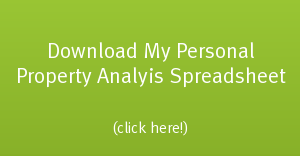The following post was written by a colleague and super-intelligent real estate investor John Fedro. This is blog post number one in a three part series from John. He has a highly interesting niche in Real Estate Investing, especially for those just starting out. Make sure you bookmark his blog as well.
Add this Investment Bullet to Your Real Estate Ammo-Belt
“What do you want to be when you grow up?” This is the question that gets pounded into our brains over and over again by nosey adults encouraging youth to look ahead and consider their options for the future or by adults looking for a cute and whimsical answer. So, what did you want to be when you grew up? Did you become it? [please comment below] This was my list starting at the age of 5: a cowboy, Elvis, a grocery-store bagger, an executive chef, and lastly a physical therapist. The last choice landed me at Notre Dame studying Medicine in the hopes for a well paying job with security in the next 7 years.
I had everything to look forward to in life– graduating, starting my career, getting a mortgage, settling down, working for the next 50 years at a job I wasn’t thrilled about, and growing old with just a moderate income. I hated the very thought!!! Not all of it mind you, only the unhappy-part slaving away at a career for the next 50 years making someone else wealthy.
Do you ever feel this way?
So it is safe to say that many of us are here to make money with real estate, whether in passive monthly payments such as rent and owner-financing to BIG paydays from short-sales, wholesales, rehab projects, and the list goes on…
In fact for many starting investors simply choosing the right specialty or niche of real estate investing can make or break that investor’s drive and/or spirit from moving forward and ever closing a deal. I was recently talking with a local Real Estate Investors Club President and asked him how many of his members have yet to do their first deal, my jaw-dropped when “Mr. President” replied over 90% of his regular audience has yet to acquire their first R/E investment! Come to find out that this statistic is common in many real estate investing clubs and meet-ups.
Why go after the Big Fish first?
When I first started investing in 2002 I read a popular investing course at the time and implemented the exact techniques I was being taught. I mailed letters, hung signs, cold-called sellers, made over 200 offers via Realtors alone without a single deal accepted. In addition every private seller I spoke with seemed to be wanting retail prices for their home or only wanted all-cash (as opposed to creative financing). I was spinning my wheels spending my savings on marketing and was losing deals to local big-named investors with the available-cash to purchase homes quickly and at a low cost.
I needed a way to make serious cash-flow fast without risking much money (because I didn’t have much left) and did not require credit (as I was 20 at the time and had a lack of established credit).
Failing Forward
Three months after making my first investment offer I was out of money and running low on morale. Around this time I was feeling uneasy and unsure about my next move. I received a call from a seller selling a unique home that seemed to be unsellable. In fact every other investor told her to “get lost” (I’m paraphrasing). This was soon to be my first investment property! The home is a beautiful 3 bedroom 2 bathroom plus den house overlooking the water near Tampa, Fl. Best part is she was only asking $8,000 for the entire 1,200 sq ft home!
Have you guessed it yet?
Hint #1: The land the home is on is rented monthly by the home owner from the land owner.
Hint #2: You think many of these homes have wheels, but many do not.
If you have ever thought about investing an inexpensive mobile home and reselling it to a park approved buyer for cash-flow payments of $300-$600 per month, it’s time to think again. Here’s a little about what you’ll discover in my next blog posts here at RealEstateInYourTwenties.com.
- How you can get started immediately investing in mobile homes with little capital and almost zero risk
- Which mobile homes make you the most money
- Case study: How to structure a deal using the 3/2 mobile home example above
Thank you again to Brandon Turner for allowing me to publish these thoughts for all of you awesome readers and fans to enjoy. I am always available at the email below. Everyone here has helped make this blog and network a wonderful place to grow and learn as active real estate investors. Rising waters lift all boats!
Impact a life daily,
John Fedro
John Fedro is a leading expert in creating passive-income utilizing mobile homes for beginner and novice cash-flow seeking audiences with an award winning blog, an online podcast series, do-it-yourself video tutorials, and an E-magazine that benefits national charities. He has helped close over 120 real estate transactions in over 27 states. He also co-established the first interactive performance-based online education classroom for mobile home investors. John has helped redefine investing in mobile homes as a popular and lucrative addition to traditional real estate investments for cash-flow.
P.S. looking for hard money loans in California? Be sure to check out my friends over at northcoastfinancialinc.com. They have very competitive rates, can fund within a week and specialize in fix and flip loans and other hard money loans.

 If this is your first time here at Real Estate In Your Twenties.com - welcome!
If this is your first time here at Real Estate In Your Twenties.com - welcome! 





